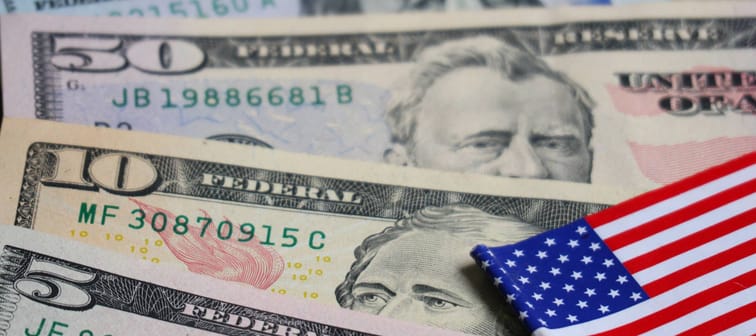Rise of non-traditional currencies
The 1944 Bretton Woods Conference, attended by 44 countries, allowed other countries to accumulate reserves of U.S. dollars, helping the currency grow in dominance.
Countries use foreign currency reserves for numerous reasons. They use it not only to have liquid currency in case of crisis and price their exports competitively, but they also require these reserves to pay external debts or simply make profits out of diversified portfolios.
While the U.S. dollar is still dominant, there have been some notable developments that could possibly threaten its hold.
One of these developments is the emergence of currencies considered previously non-traditional that have earned the honorary title COFER, which stands for Currency Composition of Official Foreign Exchange Reserves.
“In 2000, hardly any [foreign] central bank held Canadian dollars as reserves,” Aberra wrote in a June 6 opinion piece for the Toronto Star.
International Monetary Fund data for the first quarter of 2022 shows there are $287 billion Canadian dollars held by world countries as foreign reserves.
While it’s “admittedly a small fraction of the total world reserves,” continued Aberra, it’s, however, a “significant increase in the normally tectonic changes of international reserve holdings.”
Empower your investments with Qtrade
Discover Qtrade's award-winning platform and take control of your financial future. With user-friendly tools, expert insights, and low fees, investing has never been easier.
Start Trading TodayRising competitors
Changes in the makeup of foreign reserves are disrupting the status-quo list of what has long been known as the big four: the U.S. dollar, the British pound, the Japanese yen and the euro. The big four dominated foreign reserves, accounting for 98% of the foreign reserve in 1999, and standing at 92% as of 2021.
Aside from Canada, Australia is also making strides, with countries holding about $225.48 billion Australian dollars in the first quarter of 2022.
“A loss to the U.S. is a gain to the other countries whose currencies are being accepted as reserve currencies,” Aberra explained.
In late June, President Vladmir Putin signaled that Russia, and other members of BRICS (Brazil, Russia, India, China, South Africa) are going to create a new international reserve currency.
Not only that but more countries are showing interest in joining BRICS, including Saudi Arabia and NATO-member Turkey.
Will Canada be affected?
The decline also means an “increase” in the cost of financing the U.S. balance of payments and budget deficit.
“If people holding Eurodollars start using their dollars to buy U.S. goods and services, there will be a transfer of real resources from the U.S. to the rest of the world,” the professor said.
However, Canada is highly dependent on the U.S. economy, and if the latter sneezes the former will catch the flu.
“I doubt if the average Canadian has ever given this question a moment's thought,” says Laidler.
“To the extent that a fall in the U.S. share of international reserves represents a diminution of U.S. prosperity and international influence, Canadians ought to worry a little,” he added.
“Though we don't like to admit it, our own prosperity and stability are greatly affected by what happens there. Geography does matter in these affairs.”
Unexpected vet bills don’t have to break the bank
Life with pets is unpredictable, but there are ways to prepare for the unexpected.
Fetch Insurance offers coverage for treatment of accidents, illnesses, prescriptions drugs, emergency care and more.
Plus, their optional wellness plan covers things like routine vet trips, grooming and training costs, if you want to give your pet the all-star treatment while you protect your bank account.
Get A QuoteRise of digital currency and weaponization of U.S. dollar
During a CNBC interview in March, Jeremy Siegel, a professor at the Wharton School of the University of Pennsylvania warned of “bitcoin taking over” as inflation began its escalation.
Siegel’s fear isn’t unfounded.
“I think this trend will be accelerated as a result of technological changes in international payments, the proliferation of regional trading blocs that will create their own systems of international payments, and the increased weaponization of the U.S. dollar as a foreign policy instrument by the U.S. government against a number of emerging and developing countries,” Aberra explained.
Putin’s defiance for example probably comes as no surprise. After all, Moscow admitted in March that it can't use nearly half of its $640 billion in foreign currency following Western sanctions.
Still hope for U.S. dollar
In spite of challenges facing the U.S. dollar, not all studies are gloomy.
A study by the Federal Reserve Bank of New York staff had a more optimistic outlook on the dollar’s strength.
“The dollar’s international role, whether for trade, investment or use as a global reserve currency, remains quite strong, with nothing on the horizon likely to rival it,” authors Linda Goldberg, Robert Lerman, and Dan Reichgott wrote in a blog on July 5.
In their study, the authors confronted all the points pitched against the U.S. dollar.
In hindsight of the growth of the digital currencies such as central bank digital currencies (CBDCs) and cryptocurrencies, there is the “preponderance of efforts to anchor stablecoins against the U.S. dollar.”
“Virtually all stablecoins (on a value weighted basis) aim to maintain a ‘peg’ with the dollar,” they said in defence of the dollar.
The authors also explained that the U.S. dollar remains by “far the most traded currency” worldwide.
“Approximately half of all cross-border loans, international debt securities, and trade invoices are denominated in U.S. dollars, while roughly 40% of SWIFT messages and 60% of global foreign exchange reserves are in (U.S.) dollars,” their defence continued.
What does this mean for the future?
As the debate lingers, skeptics such as Frank Giustra, a Canadian businessman and co-chair of the International Crisis Group admits that the U.S. dollar “still rules” but acknowledges the wind of change that the “world is clearly jockeying for what comes next.”
While non-traditional currencies from Canada and Australia, both Liberal democracies as well as major commodity exporting nations make them more attractive, the end result isn’t clear. But then, no one is holding the crystal ball predicting how the new world order is going to unfold. Who knows, we might eventually have a leaderless digital currency taking over, making Canadian, U.S. or Australian foreign reserves less important.
Trade Smarter, Today
Build your own investment portfolio with the CIBC Investor's Edge online and mobile trading platform and enjoy low commissions. Get 100 free trades and $200 or more cash back until March 31, 2025.









